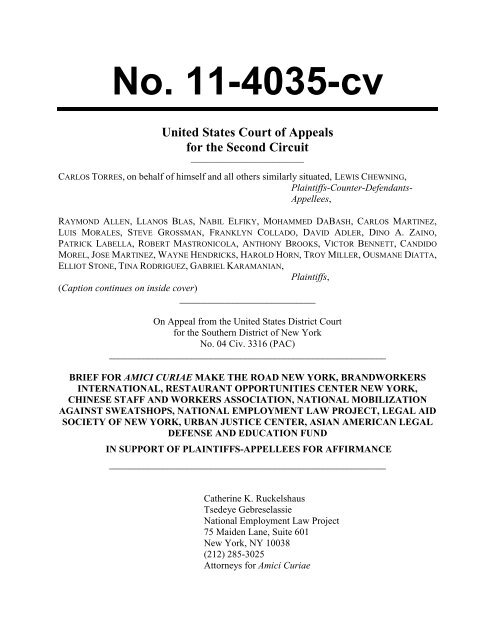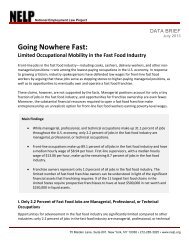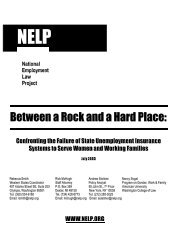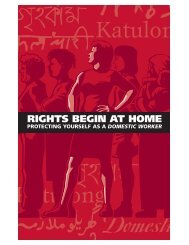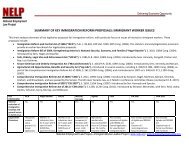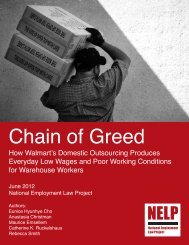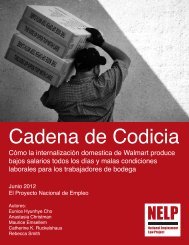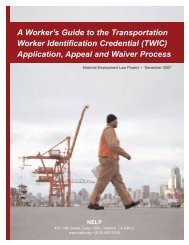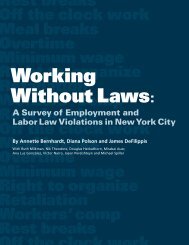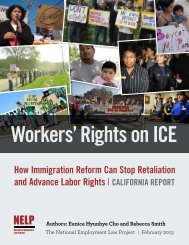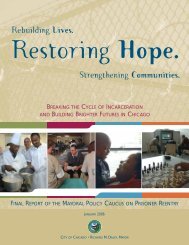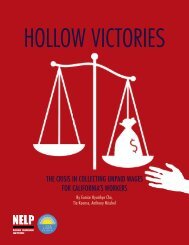Torres v. Gristede's Operating Corp.
Torres v. Gristede's Operating Corp.
Torres v. Gristede's Operating Corp.
Create successful ePaper yourself
Turn your PDF publications into a flip-book with our unique Google optimized e-Paper software.
No. 11-4035-cv<br />
United States Court of Appeals<br />
for the Second Circuit<br />
____________________________<br />
CARLOS TORRES, on behalf of himself and all others similarly situated, LEWIS CHEWNING,<br />
Plaintiffs-Counter-Defendants-<br />
Appellees,<br />
RAYMOND ALLEN, LLANOS BLAS, NABIL ELFIKY, MOHAMMED DABASH, CARLOS MARTINEZ,<br />
LUIS MORALES, STEVE GROSSMAN, FRANKLYN COLLADO, DAVID ADLER, DINO A. ZAINO,<br />
PATRICK LABELLA, ROBERT MASTRONICOLA, ANTHONY BROOKS, VICTOR BENNETT, CANDIDO<br />
MOREL, JOSE MARTINEZ, WAYNE HENDRICKS, HAROLD HORN, TROY MILLER, OUSMANE DIATTA,<br />
ELLIOT STONE, TINA RODRIGUEZ, GABRIEL KARAMANIAN,<br />
Plaintiffs,<br />
(Caption continues on inside cover)<br />
____________________________<br />
On Appeal from the United States District Court<br />
for the Southern District of New York<br />
No. 04 Civ. 3316 (PAC)<br />
_________________________________________________________<br />
BRIEF FOR AMICI CURIAE MAKE THE ROAD NEW YORK, BRANDWORKERS<br />
INTERNATIONAL, RESTAURANT OPPORTUNITIES CENTER NEW YORK,<br />
CHINESE STAFF AND WORKERS ASSOCIATION, NATIONAL MOBILIZATION<br />
AGAINST SWEATSHOPS, NATIONAL EMPLOYMENT LAW PROJECT, LEGAL AID<br />
SOCIETY OF NEW YORK, URBAN JUSTICE CENTER, ASIAN AMERICAN LEGAL<br />
DEFENSE AND EDUCATION FUND<br />
IN SUPPORT OF PLAINTIFFS-APPELLEES FOR AFFIRMANCE<br />
_________________________________________________________<br />
Catherine K. Ruckelshaus<br />
Tsedeye Gebreselassie<br />
National Employment Law Project<br />
75 Maiden Lane, Suite 601<br />
New York, NY 10038<br />
(212) 285-3025<br />
Attorneys for Amici Curiae
BRIAN HOMOLA, ANNA GARRETT, NELSON BETANCOURT, JOSE DELACRUZ, YURI LAMARCHE,<br />
MICHAEL GROSECLOSE, RODOLFO DELEMOS, PIO MOREL, ABIGAIL CLAUDIO, MALICK DIOUF,<br />
DAVID OTTO, ALEJANDRO MORALES, VICTOR DIAZ, PAUL PETROSINO, EDUARDO GONZALEZ, JR.,<br />
JOSE BONILLA-REYES, VINCENT PEREZ, MARTIN GONZALEZ, CALVIN ADAMS, WILLIAM FRITZ,<br />
KATHERINE HALPERN, CHRISTIAN TEJADA, EDWARD STOKES, PLINIO MEDINA, TOWANA STARKS,<br />
LAWSON HOPKINS, RUBEN M. ALEMAN, EUGENE RYBACKI, EARL CROSS, MANOLO HIRALDO,<br />
ROBERT HAIRSTON,<br />
and<br />
BOBBY IRIZARRY, RUBEN MORA, JOSELITO AROCHO, JOSEPH CREMA, ALFRED CROKER, FRANK<br />
DELEON, MARIO DIPRETA, WILLIAM HELWIG, ROBERT MISURACA, ROBERT PASTORINO, VICTOR<br />
PHELPS, DANIEL SALEGNA, GILBERTO SANTIAGO,<br />
Plaintiffs-Appellees,<br />
v.<br />
GRISTEDE’S OPERATING CORP., GRISTEDE’S FOODS NY, INC., NAMDOR, INC., GRISTEDE’S FOODS,<br />
INC., CITY PRODUCE OPERATING CORP.,<br />
Defendants-Counter-Claimants,<br />
GALLO BALSECA, JAMES MONOS,<br />
Defendants,<br />
JOHN CATSIMATIDIS,<br />
Defendant-Appellant.
RULE 26.1 CORPORATE DISCLOSURE STATEMENT<br />
Pursuant to Federal Rule of Appellate Procedure 29(c), Amici Curiae hereby<br />
provide the following disclosure statements:<br />
Make the Road New York is a non-profit corporation that offers no stock;<br />
there is no parent corporation or publicly owned corporation that owns 10% or<br />
more of this entity’s stock.<br />
Brandworkers International is a non-profit corporation that offers no<br />
stock; there is no parent corporation or publicly owned corporation that owns 10%<br />
or more of this entity’s stock.<br />
Restaurant Opportunities Center New York is a non-profit corporation<br />
that offers no stock; there is no parent corporation or publicly owned corporation<br />
that owns 10% or more of this entity’s stock.<br />
Chinese Staff and Workers Association is a non-profit corporation that<br />
offers no stock; there is no parent corporation or publicly owned corporation that<br />
owns 10% or more of this entity’s stock.<br />
National Mobilization Against Sweatshops is a non-profit corporation that<br />
offers no stock; there is no parent corporation or publicly owned corporation that<br />
owns 10% or more of this entity’s stock.
National Employment Law Project is a non-profit corporation that offers<br />
no stock; there is no parent corporation or publicly owned corporation that owns<br />
10% or more of this entity’s stock.<br />
Legal Aid Society of New York is a non-profit corporation that offers no<br />
stock; there is no parent corporation or publicly owned corporation that owns 10%<br />
or more of this entity’s stock.<br />
Urban Justice Center is a non-profit corporation that offers no stock; there<br />
is no parent corporation or publicly owned corporation that owns 10% or more of<br />
this entity’s stock.<br />
Asian American Legal Defense and Education Fund is a non-profit<br />
corporation that offers no stock; there is no parent corporation or publicly owned<br />
corporation that owns 10% or more of this entity’s stock.
TABLE OF CONTENTS<br />
TABLE OF AUTHORITIES ................................................................................... iii<br />
STATEMENT OF INTEREST OF AMICI CURIAE ................................................ 1<br />
SUMMARY OF ARGUMENT ................................................................................. 6<br />
ARGUMENT ...........................................................................................................10<br />
I. IT IS FAIR AND NECESSARY TO HOLD INDIVIDUALS LIKE<br />
CATSIMATIDIS JOINTLY AND SEVERALLY LIABLE UNDER SECTION<br />
203(d) BECAUSE OF PERSISTENT BARRIERS TO RECOVERY OF<br />
UNPAID WAGES EVEN AFTER A LIABILITY FINDING, AND<br />
CONTINUING HIGH RATES OF VIOLATIONS, ESPECIALLY IN LOW-<br />
WAGE INDUSTRIES LIKE RETAIL. ................................................................10<br />
A. Individual Liability Deters Violations and is a Crucial Alternative Through<br />
Which Workers Can Recover Their Illegally Withheld Wages, Especially in<br />
Cases Where Workers are Unable to Recover From the <strong>Corp</strong>orate<br />
Defendant(s).......................................................................................................10<br />
B. A Reversal Would Undermine the Act By Rewarding Catsimatidis’<br />
Behavior to Avoid Compliance with the Act. ...................................................12<br />
C. The FLSA Must Be Interpreted Consistent With Its Broad Remedial<br />
Purpose to Hold Individuals Like Catsimatidis Liable Because Rampant<br />
Violations of Wage and Hour Rights Persist, Particularly in Low-Wage<br />
Industries Like Retail. ........................................................................................15<br />
II. INDIVIDUAL LIABILITY UNDER 29 U.S.C. § 203(d) IS EXPANSIVE,<br />
CONSISTENT WITH THE REMEDIAL PURPOSE OF THE FLSA. ..............19<br />
III. DETERMINING WHETHER AN INDIVIDUAL ACTED “DIRECTLY<br />
OR INDIRECTLY IN THE INTEREST OF” THE CORPORATE EMPLOYER<br />
IS A BROAD INQUIRY, FOCUSING ON THE RELATIONSHIP BETWEEN<br />
THAT INDIVIDUAL AND THE CORPORATE ENTITY AND EXAMINING<br />
THE EXTENT TO WHICH THE INDIVIDUAL HAD CONTROL OVER THE<br />
i
CORPORATION SUCH THAT HIS DECISIONS AND ACTIONS ON<br />
BEHALF OF THE CORPORATION CAN IMPACT COMPLIANCE WITH<br />
THE FLSA. ...........................................................................................................22<br />
A. The Test for Determining Individual Liability in the Instant Case is<br />
Whether Catsimatidis, as a Result of His Relationship With the <strong>Corp</strong>orate -<br />
Employer, Is Acting in the Interest of That Employer as it Relates to the<br />
Employee(s). ......................................................................................................23<br />
B. The Expansive Definition of “Employer” Under Section 203(d) to Include<br />
Individuals With Operational Control of the <strong>Corp</strong>oration is Consistent With<br />
FLSA’s Goal of Eliminating Substandard Wages and Working Conditions By<br />
Broadly Defining Employer Accountability to Reach All Those in a Position to<br />
Prevent Violations of the Act. ...........................................................................25<br />
C. Courts Routinely Hold Liable as Employers Individuals With Far Less<br />
Operational Control Over the <strong>Corp</strong>orate Entity Than Catsimatidis. .................29<br />
CONCLUSION ........................................................................................................31<br />
ii
TABLE OF AUTHORITIES<br />
Cases<br />
A.H. Phillips v. Walling, 324 U.S. 490 (1945) ........................................................19<br />
Ansoumana v. Gristede’s <strong>Operating</strong> <strong>Corp</strong>., 255 F. Supp. 2d 184 (S.D.N.Y. 2003)<br />
....................................................................................................................... 27, 28<br />
Barrentine v. Arkansas Best Freight System, Inc., 450 U.S. 728 (1981) ................19<br />
Baystate Alternative Staffing v. Herman, 163 F.3d 668 (1st Cir. 1998) ..............9, 22<br />
Boucher v. Shaw, 572 F.3d 1087 (9th Cir. 2009) ....................................................12<br />
Chan v. Sung Yue Tung <strong>Corp</strong>., d/b/a/ 88 Palace, No. 03 Civ. 6048 (GEL), 2007<br />
WL 313483 (S.D.N.Y. Feb. 1, 2007) ............................................................ 30, 31<br />
Dole v. Elliot Travel & Tours, Inc., 942 F.2d 962 (6th Cir. 1991) .................. passim<br />
Dole v. Simpson, 784 F. Supp. 538 (S.D. Ind. 1991) ...............................................25<br />
Donavan v. Agnew, 712 F.2d 1509 (1st Cir. 1983) .......................................... 24, 28<br />
Donavan v. Grim Hotel, 747 F.2d 966 (5th Cir. 1984) .......................................7, 26<br />
Donavan v. Maxim Industries, 552 F.Supp. 1024 (D. Mass 1982) .........................25<br />
Donavan v. Sovereign Sec. Ltd., 726 F.2d 55 (2d Cir. 1984) ........................... 13, 14<br />
Herman v. RSR Security Servs., 172 F.3d 132 (2d Cir. 1999) .................... 22, 26, 29<br />
Lopez v. Silverman, 14 F. Supp.2d 405 (S.D.N.Y. 1998) ................................. 12, 22<br />
Rutherford Food <strong>Corp</strong>. v. McComb, 331 U.S. 722 (1947) ......................................20<br />
Schultz v. Chalk-Fitzgerald Const. Co., 300 F.Supp. 1255 (D. Mass 1970) ...........24<br />
iii
Sec’y of Labor, U.S. Dep’t of Labor v. Lauritzen, 835 F.2d 1529 (7th Cir. 1987) .23<br />
Tennessee Coal, Iron & R. Co. v. Muscoda Local No. 123, 321 U.S. 590 (1944) ..10<br />
<strong>Torres</strong> v. Gristede’s <strong>Operating</strong> <strong>Corp</strong>. (<strong>Torres</strong> II), 628 F. Supp. 2d 447 (S.D.N.Y.<br />
2008) ....................................................................................................................... 6<br />
<strong>Torres</strong> v. Gristede’s <strong>Operating</strong> <strong>Corp</strong>., No. 04 Civ. 3316, 2011 WL 4571792<br />
(S.D.N.Y. Sept. 23, 2011) ................................................................... 7, 13, 28, 29<br />
United States v. Rosenwasser, 323 U.S. 360 (1945) ...........................................9, 21<br />
Walling v. Portland Terminal Co., 330 U.S. 148 (1947).........................................21<br />
Yu G. Ke v. Saigon Grill, Inc., 595 F. Supp. 2d 240 (S.D.N.Y. 2008) ............. 29, 30<br />
Statutes<br />
29 U.S.C. § 202(a) ...............................................................................................7, 19<br />
29 U.S.C. § 202(b) ...................................................................................................15<br />
29 U.S.C. § 203(d) ........................................................................................... passim<br />
29 U.S.C. § 203(m) ..................................................................................................11<br />
Other Authorities<br />
Annette Bernhardt et. al., Broken Laws, Unprotected Workers: Violations of<br />
Employment and Labor Laws in America’s Cities, Center for Urban Economic<br />
Development at the University of Illinois-Chicago, Nat’l Employment Law<br />
Project & UCLA Institute for Research on Labor and Employment (September<br />
2009) .............................................................................................................. 16, 18<br />
Annette Bernhardt, Diana Polson and James DeFilippis, Working Without Laws: A<br />
Survey of Employment and Labor Law Violations in New York City, National<br />
Employment Law Project (2010) .........................................................................17<br />
iv
Annette Bernhardt, Siobhan McGrath and James DeFilippis, Unregulated Work in<br />
the Global City: Employment and Labor Law Violations in New York City,<br />
Brennan Center for Justice at New York University School of Law (2007) .......17<br />
Bruce Goldstein, Marc Linder, Laurence E. Norton II & Catherine Ruckelshaus,<br />
Enforcing Fair Labor Standards in the Modern American Sweatshop:<br />
Rediscovering the Statutory Definition of Employment, 46 UCLA L. Rev. 983<br />
(April 1999) ................................................................................................... 14, 20<br />
David Weil & Amanda Pyles, Why Complain Complaints, Compliance, and the<br />
Problem of Enforcement in the U.S. Workplace, 27 COMP. LAB. L. & POL’Y<br />
J. 59, 83 (2005) .............................................................................................. 18, 19<br />
Noah Zatz, “Working Beyond the Reach or Grasp of Employment Law,” The<br />
Gloves-Off Economy: Workplace Standards at the Bottom of America’s Labor<br />
Market, Annette Bernhardt, Heather Boushey, Laura Dresser and Chris Tilly<br />
(eds.) (Ithaca: Cornell University Press, 2009) ....................................................15<br />
Stephanie Luce & Naoki Fujita, Discounted Jobs: How Retailers Sell Workers<br />
Short, City University of New York and the Retail Action Project (January 2012)<br />
..............................................................................................................................17<br />
Testimony, Nancy J. Leppink, Deputy Wage and Hour Administrator, U.S. Dep’t<br />
of Labor Before the U.S. House of Representatives (November 3, 2011) ...........18<br />
U.S. Gov’t. Accountability Office, GAO-09-458T, Wage and Hour Division’s<br />
Complaint Intake and Investigative Processes Leave Low Wage Workers<br />
Vulnerable to Wage Theft 18 (March 25, 2009) ...................................................19<br />
Winning Wage Justice: A Summary of Research on Wage and Hour Violations in<br />
the United States, National Employment Law Project (January 2012) ...............15<br />
v
STATEMENT OF INTEREST OF AMICI CURIAE 1<br />
Amici are organizations dedicated to ensuring that the Fair Labor Standards<br />
Act (“FLSA”) is interpreted and enforced consistent with its broad remedial nature<br />
so that workers are paid fairly and fully for all work performed. Amici Make the<br />
Road New York, Brandworkers International, Restaurant Opportunities Center<br />
New York, Chinese Staff and Workers Association and National Mobilization<br />
Against Sweatshops have members residing in Second Circuit states who would be<br />
adversely impacted by a ruling against the Plaintiffs-Appellees. Amici submit this<br />
brief not to repeat the arguments made by the parties, but to shed light on the<br />
historical and statutory underpinnings of the Fair Labor Standards Act, including<br />
the definition of “employer” under Section 203(d) and the public policies<br />
embodied in the Act, and to bring to the Court’s attention our unique perspectives<br />
of low-wage workers’ experiences in enforcing their wage and hour rights. We<br />
urge the Court to consider the large numbers of workers whose right to recover<br />
their unlawfully withheld wages would be undermined under the Appellant’s<br />
misrepresentation of the FLSA.<br />
1 Party’s counsel did not author this brief, nor did the party or the party’s counsel<br />
contribute money intended to fund the preparation or submission of the brief. No<br />
person other than the Amici curiae, their members, or their counsel contributed<br />
money that was intended to fund the preparation or submission of the brief.<br />
1
Amici respectfully submit this brief pursuant to Federal Rules of Appellate<br />
Procedure 27 and 29 and Second Circuit Local Rule 29-1. The brief should be<br />
permitted without leave of court because all parties have consented to its filing.<br />
Fed. R. App. P. 29(a).<br />
Make the Road New York (MRNY) is a membership based non-profit<br />
organization with more than 11,000 members and offices in Brooklyn, Queens,<br />
Staten Island and Long Island. For the last fifteen years MRNY has been fighting<br />
for the rights of low-wage workers who have experienced the most severe forms of<br />
wage theft. MRNY has litigated and recovered hundreds of thousands of dollars in<br />
unpaid wages and has successfully pursued legislation such as the Wage Theft<br />
Prevention Act, strengthening labor law protections in New York State.<br />
Narrowing the definition of employer under 203(d) would severely undercut these<br />
basic protections for workers, allowing individual employers to manipulate the<br />
corporate entity and escape liability.<br />
Brandworkers International is a non-profit organization protecting and<br />
advancing the rights of retail and food employees. Brandworkers' members<br />
frequently seek to hold individual employers liable for minimum wage and<br />
overtime violations to help ensure judgments are honored. Narrowing the<br />
employer definition under the FLSA would increase the likelihood that<br />
2
Brandworkers members would suffer illegal underpayment of wages with no<br />
monetary recovery even after a finding of liability.<br />
Restaurant Opportunities Center New York (ROC-NY) is a membership<br />
organization of restaurant workers that seeks to improve working conditions<br />
through research and policy work and providing organizing support to workers.<br />
Because restaurant workers suffer high rates of wage and hour violations, the<br />
FLSA’s expansive definition of “employer” under 203(d) is crucial for ROC-NY<br />
members, who oftentimes need to hold individuals liable for minimum wage and<br />
overtime violations to ensure they can collect their unpaid wages.<br />
Founded in 1979, Chinese Staff and Workers Association (CSWA) has more<br />
than 1,300 members, many of whom work in restaurants in New York City and on<br />
Long Island. CSWA assists its members in combating illegal and exploitative<br />
conditions in these restaurants, including violations of the FLSA and NYLL, and<br />
the expansive definition of “employer” under 203(d) is vital in ensuring that<br />
CSWA members can recover their unpaid wages.<br />
National Mobilization Against Sweatshops is a non-profit workers center<br />
whose members include workers employed in the service, retail, garment,<br />
construction and white-collar industries. Many of NMASS’ members’ efforts to<br />
recover owed minimum wage and overtime pay and improve working conditions<br />
are thwarted by companies’ tactics to avoid responsibility by closing down and<br />
3
changing names or declaring bankruptcy. The ability to hold individual employers<br />
liable for owed wages is vital for these workers’ efforts to enforce their rights<br />
under the FLSA.<br />
The National Employment Law Project (NELP) is a non-profit legal<br />
organization with over 40 years of experience advocating for the employment and<br />
labor rights of low-wage and unemployed workers. NELP seeks to ensure that all<br />
employees receive the full protection of labor and employment laws, and that<br />
employers are not rewarded for skirting those basic rights. NELP collaborates<br />
closely with community-based worker centers and has litigated and participated as<br />
amicus in numerous cases addressing employee rights under the FLSA. In<br />
NELP’s experience, an expansive reading of the term “employer” under the FLSA,<br />
consistent with that statute’s remedial purpose, is crucial in ensuring that low-wage<br />
workers in particular can fully recover their unpaid wages.<br />
The Legal Aid Society is the oldest and largest provider of legal assistance<br />
to low-income families and individuals in the United States. The Society’s<br />
Employment Law Unit in New York City represents low-wage workers in<br />
employment-related matters such as claims for unpaid wages. The Unit often<br />
litigates against employers that use corporate forms to try to evade responsibility<br />
under various labor laws or to make collection of judgments difficult. The broad<br />
4
definition of “employer” under the FLSA is critical to the Unit’s ability to enforce<br />
that Act.<br />
Founded in 1984, the Urban Justice Center (UJC) is a New York City-based<br />
nonprofit organization that represents many low-wage employees who have sought<br />
redress in the courts against employers who have violated the FLSA and New York<br />
Labor Law (NYLL). Almost all of the corporations that employ UJC’s clients are<br />
privately owned and represent themselves as having limited assets to satisfy<br />
judgments or settlements. These corporations typically operate small businesses,<br />
such as restaurants, nail salons and convenience stores, and do significant business<br />
off the books, making it hard for employees to trace assets that can satisfy their<br />
claims. In light of these challenges, the ability to hold the principals of these<br />
corporations liable is of critical importance to the ability of UJC’s clients and other<br />
low-wage workers to vindicate their rights under the FLSA and NYLL.<br />
Founded in 1974, the Asian American Legal Defense and Education Fund<br />
(AALDEF) is a national non-profit organization that protects and promotes the<br />
civil rights of Asian-Americans through litigation, advocacy, education, and<br />
organizing. AALDEF represents low-wage workers in actions under the FLSA<br />
and NYLL, and AALDEF’s clients have frequently been unable to collect against<br />
corporate defendants, even after a finding of liability, making it critical that these<br />
workers are able to recover their unpaid wages from individual employers.<br />
5
SUMMARY OF ARGUMENT<br />
This is not a close case. There should be no question that Defendant-<br />
Appellant Catsimatidis (hereinafter “Catsimatidis”) – the sole owner, President,<br />
CEO and Chairman of the Board of Gristede’s, one who can “run the entire<br />
operation” – is an employer under the Section 203(d) of the Fair Labor Standards<br />
Act (FLSA).<br />
This case was brought by grocery employees who were illegally denied<br />
overtime pay while employed at Gristede’s supermarkets. Four years ago, the<br />
district court granted summary judgment to these employees on their Fair Labor<br />
Standards Act (FLSA) and New York Labor Law (NYLL) claims against<br />
Gristede’s. <strong>Torres</strong> v. Gristede’s <strong>Operating</strong> <strong>Corp</strong>. (<strong>Torres</strong> II), 628 F. Supp. 2d 447<br />
(S.D.N.Y. 2008). The parties subsequently reached a settlement agreement, which<br />
specifically provided that if the corporate defendants were to default on their<br />
payment obligations, the district court would decide the Plaintiffs-Appellees’<br />
(hereinafter “Appellees”) motion for summary judgment as to whether<br />
Catsimatidis was an “employer” under Section 203(d) of the FLSA. Gristede’s<br />
defaulted on its payments, and the district court subsequently granted summary<br />
judgment in Appellees’ favor, holding that it was “pellucidly clear” that<br />
Catsimatidis had “operational control” over the corporate defendant and was thus<br />
an employer under Section 203(d). In particular, the district court noted that<br />
6
Catsimatidis could “run the entire operation” and that he “made his fortune trading<br />
in the type of goods sold . . . in Gristede’s.” <strong>Torres</strong> v. Gristede’s <strong>Operating</strong> <strong>Corp</strong>.,<br />
No. 04 Civ. 3316, 2011 WL 4571792, at *1 (S.D.N.Y. Sept. 23, 2011). It was<br />
clear to the district court that Catsimatidis is the top man at Gristede’s, and that the<br />
corporation functions for his profit.<br />
Compare with Dole v. Elliot Travel & Tours,<br />
Inc., 942 F.2d 962, 966 (6th Cir. 1991) (individual liable where he was “top man”<br />
at the corporation and corporation functioned for his profit); Donavan v. Grim<br />
Hotel, 747 F.2d 966, 972 (5th Cir. 1984) ([t]he corporations, speaking<br />
pragmatically, were [the individual’s] and functioned for the profit of his family . .<br />
. [he] was the “top man”).<br />
Catsimatidis now seeks a reversal of the district court’s order holding him to<br />
be an employer. A reversal would reward Gristede’s and Catsimatidis for their<br />
conduct, both in failing to pay the wages due under the FLSA in the first instance,<br />
and in finding ways to avoid payment even after judgment. Such a result would<br />
severely undermine the twin purposes of the FLSA – eliminating substandard labor<br />
conditions while preventing these conditions from being used as an “unfair method<br />
of competition” against reputable employers, 29 U.S.C. § 202(a) – by absolving<br />
from liability an individual who clearly had the power to ensure compliance with<br />
the Act, and who is profiting from his refusal to comply with the Act.<br />
7
Holding individuals like Catsimatidis individually and jointly and severally<br />
liable for violations of the FLSA may deter violations of the Act in the first<br />
instance, and facilitates the remedial purposes of the Act where the corporate<br />
employer, for reasons that may include deliberate attempts to avoid paying wage<br />
claims, is unable to satisfy a judgment. As cases throughout this Circuit show,<br />
and as amici’s own experiences demonstrate, individual liability is an important<br />
alternative through which workers can recover the unpaid wages due to them in<br />
cases where corporate defendants file for bankruptcy, claim insolvency, hide their<br />
assets, shut down operations and reorganize as a “new” entity, or simply stop<br />
making settlement payments. For low-wage workers in particular, many of whom<br />
work for fly-by-night businesses, undercapitalized firms, and other entities where<br />
recovery is difficult if not impossible, individual liability under Section 203(d) is<br />
often the only way to collect their unpaid wages, even after a finding of liability.<br />
Given the high rates of FLSA violations and significant barriers to enforcement<br />
and recovery, especially in low-wage industries like retail, it is of paramount<br />
importance that aggrieved employees are able to recover the wages they are owed<br />
from individuals like Catsimatidis.<br />
In enacting the Fair Labor Standards Act in 1938, Congress adopted<br />
strikingly expansive coverage terms, including the definition of “employer” under<br />
Section 203(d), purposely designed to go well beyond traditional common-law<br />
8
control principles to encompass all individuals and entities in a position to ensure<br />
compliance with the Act. Indeed, “a broader or more comprehensive coverage . . .<br />
would be difficult to frame.” United States v. Rosenwasser, 323 U.S. 360, 362<br />
(1945).<br />
Consistent with holding accountable all those in a position to ensure<br />
compliance with the Act, Section 203(d) provides that any person acting “directly<br />
or indirectly in the interest of the employer as it relates to the employee” is jointly<br />
and severally liable for violations of the Act. Where there is a corporate employer<br />
that has been held to be liable, the determination of whether an individual is acting<br />
“directly or indirectly in the interest” of this employer is a broad inquiry focused<br />
on the relationship between the individual and the corporation as it relates to the<br />
employee – not between the individual and the employee claiming unpaid wages.<br />
This is why, in examining this relationship, individuals are liable if they are in a<br />
position to ensure compliance with the FLSA by exercising “operational control”<br />
over the corporation. As courts have explained, an individual’s operational<br />
control over a corporation suggests that he can “cause the corporation to<br />
compensate (or not to compensate) employees in accordance with the FLSA,”<br />
Baystate Alternative Staffing v. Herman, 163 F.3d 668, 678 (1st Cir. 1998).<br />
9
ARGUMENT<br />
I. IT IS FAIR AND NECESSARY TO HOLD INDIVIDUALS LIKE<br />
CATSIMATIDIS JOINTLY AND SEVERALLY LIABLE UNDER<br />
SECTION 203(d) BECAUSE OF PERSISTENT BARRIERS TO<br />
RECOVERY OF UNPAID WAGES EVEN AFTER A LIABILITY<br />
FINDING, AND CONTINUING HIGH RATES OF VIOLATIONS,<br />
ESPECIALLY IN LOW-WAGE INDUSTRIES LIKE RETAIL.<br />
A. Individual Liability Deters Violations and is a Crucial Alternative<br />
Through Which Workers Can Recover Their Illegally Withheld<br />
Wages, Especially in Cases Where Workers are Unable to<br />
Recover From the <strong>Corp</strong>orate Defendant(s).<br />
As discussed in Section I(c), infra, wage and hour violations are pervasive<br />
across low-wage industries and workers face significant barriers to enforcement of<br />
their workplace rights. It is thus crucial that the FLSA is properly interpreted and<br />
applied, consistent with its broad remedial purpose, to ensure that workers are paid<br />
the wages they are owed and are able to recover when they are not properly paid.<br />
See Tennessee Coal, Iron & R. Co. v. Muscoda Local No. 123, 321 U.S. 590, 597<br />
(1944) (“We are not here dealing with mere chattels or articles of trade but with the<br />
rights of those who toil, of those who sacrifice a full measure of their freedom and<br />
talents to the use and profits of others . . . [s]uch a statute must not be interpreted or<br />
applied in a narrow, grudging manner.”).<br />
10
Individual liability creates an important deterrent effect by holding<br />
personally liable those who have the power to stop violations from taking place in<br />
the first instance. Additionally, in cases where corporate defendants file for<br />
bankruptcy, claim insolvency, hide their assets, shut down operations and<br />
reorganize as a “new” entity, or simply stop making settlement payments,<br />
individual liability provides an important alternative through which low-wage<br />
workers can recover the unpaid wages due to them.<br />
The case of Chu v. New Silver Palace Restaurant, Inc., 246 F. Supp. 2d 220<br />
(S.D.N.Y. 2002) is instructive in this regard. In this case, after the restaurant<br />
“Old” Silver Palace filed for Chapter 11 bankruptcy protection as a result of a<br />
lawsuit for unpaid wages, the restaurant re-opened under the name “New Silver<br />
Palace Restaurant”, and was run by the same principal that ran “Old Silver Palace.”<br />
From the day it opened, the new restaurant instituted the same illegal forced tip<br />
pooling arrangement that had been challenged in the earlier litigation. During<br />
subsequent litigation against the New Silver Palace Restaurant, New Silver Palace<br />
too filed for Chapter 11 bankruptcy protection to avoid paying wage claims. The<br />
District Court, holding that New Silver Palace was liable for improperly claiming a<br />
tip credit under 29 U.S.C. § 203(m), noted that the automatic stay imposed by<br />
Chapter 11 did not apply to the employees’ claims against the individual<br />
defendants, 246 F. Supp. 2d at 226, and found that “[u]nder any reasonable<br />
11
analysis, the economic reality of the ownership, corporate governance,<br />
management, and operations of the New Silver Palace is that [the four individuals]<br />
should also be considered employers under section 3(d) of the FLSA.” Id. at 227.<br />
See also Lopez v. Silverman, 14 F. Supp. 2d 405, 413 n.7 (S.D.N.Y. 1998) (noting<br />
that litigation against corporate defendant was stayed pending resolution of<br />
bankruptcy proceeding, so that immediate consequence of finding FLSA violations<br />
was that the individual defendant would be held personally liable for unpaid<br />
overtime wages); Boucher v. Shaw, 572 F.3d 1087, 1093 (9th Cir. 2009) (rejecting<br />
individual employers’ assertion that conversion of corporation’s Chapter 11<br />
bankruptcy proceeding into a Chapter 7 liquidation eliminated individual<br />
employers’ duty to pay unpaid FLSA wages because the individuals were<br />
“independently liable under the FLSA, and the automatic stay [against the<br />
corporation] has no effect on that liability.”).<br />
B. A Reversal Would Undermine the Act By Rewarding<br />
Catsimatidis’ Behavior to Avoid Compliance with the Act.<br />
The instant case is a perfect example of the importance of individual liability<br />
under the FLSA. After the District Court held that Gristede’s had violated the Act,<br />
Gristede’s and the Appellees entered into a settlement agreement providing that if<br />
Gristede’s defaulted on its requirement to make monthly settlement payments, the<br />
Court would rule on Appellees’ summary judgment motion as to the individual<br />
liability of Catsimatidis. This is exactly what happened – Gristede’s defaulted.<br />
12
Catsimatidis, who, as the District Court concluded is “the one person who is in<br />
charge of [Gristede’s]”, <strong>Torres</strong>, 2011 WL 4571792, at *3 argues that he should not<br />
be held liable. He makes this argument even as he threatened, in open court, that<br />
he could “shut down the business” and declare bankruptcy. Id. at *1. Absolving<br />
him of his responsibility as an employer would turn the FLSA on its head by<br />
rewarding Catsimatidis for the actions he has taken to avoid complying with the<br />
Act. It would put those companies and individuals that do comply with the Act at<br />
a competitive disadvantage, undermining FLSA’s goal, as described in Section II,<br />
infra, of eliminating “the competitive advantage accruing from savings in costs<br />
based on substandard labor conditions.” Roland Elec. Co., 326 U.S. at 669-70. It<br />
would absolve from liability an individual who clearly had the power to ensure<br />
compliance with the Act, and who is profiting from his refusal to comply with the<br />
Act.<br />
In amici’s experience, it is not unusual for employers, upon being found<br />
liable for violating their employees’ rights under the FLSA, to engage in such<br />
behavior in an effort to avoid paying wage claims, or to claim in settlement<br />
negotiations that they have limited assets and any settlement must take that factor<br />
into account. But as noted above, courts have looked to individual defendants to<br />
satisfy the judgments that the corporate defendants claim they cannot pay. For<br />
example, in Donavan v. Sovereign Sec. Ltd., 726 F.2d 55 (2d Cir. 1984), this Court<br />
13
noted that a corporate entity’s asserted financial difficulties, in a FLSA action, did<br />
not warrant the district court’s elimination of a pre-judgment interest award that it<br />
had correctly awarded in the first place. The corporation, after failing to comply<br />
with the district court’s backpay order, claimed that it could not pay this interest<br />
award and would be forced to go out of business if it had to. The Court found that<br />
the district court had not adequately considered the evidence the corporation put<br />
forth to support its claim, but that “of greater significance is the court’s failure to<br />
make any investigation of the individual defendants’ ability to satisfy all or part of<br />
the judgment. On this record, they were as culpable as [the corporation] and<br />
equally liable for the judgment. The court clearly erred in not considering their<br />
resources.”). 726 F.2d at 59.<br />
For low-wage workers in particular, the ability to recover fully from<br />
individual defendants is vital. Many of these workers work for fly-by-night<br />
businesses and other undercapitalized firms, where recovery against such firms is<br />
difficult if not impossible. See e.g. Bruce Goldstein, Marc Linder, Laurence E.<br />
Norton II & Catherine Ruckelshaus, Enforcing Fair Labor Standards in the<br />
Modern American Sweatshop: Rediscovering the Statutory Definition of<br />
Employment, 46 UCLA L. Rev. 983, 992-1002 (April 1999); Noah Zatz, “Working<br />
Beyond the Reach or Grasp of Employment Law,” The Gloves-Off Economy:<br />
Workplace Standards at the Bottom of America’s Labor Market, Annette<br />
14
Bernhardt, Heather Boushey, Laura Dresser and Chris Tilly (eds.) (Ithaca: Cornell<br />
University Press, 2009). This means that workers who overcome real fears of<br />
retaliation to assert their right to be paid, who file a wage claim or lawsuit, who<br />
wait as the legal or administrative process plays out, and who finally receive a<br />
winning judgment, may still be unable, in the end, to recover their unpaid wages.<br />
Such a result undermines the core purposes of the Act. Holding individual<br />
employers jointly and severally liable ensures that workers can recover their<br />
unpaid wages from any who are found to have violated the FLSA, and leaves it to<br />
those violating employers – and not the aggrieved workers – to work out amongst<br />
themselves who will ultimately bear the cost of the non-payment.<br />
C. The FLSA Must Be Interpreted Consistent With Its Broad<br />
Remedial Purpose to Hold Individuals Like Catsimatidis Liable<br />
Because Rampant Violations of Wage and Hour Rights Persist,<br />
Particularly in Low-Wage Industries Like Retail.<br />
Three-quarters of a century ago, Congress declared that the purpose of the<br />
FLSA was to “correct and as rapidly as practicable to eliminate” detrimental labor<br />
conditions. 29 U.S.C. § 202(b). Yet as numerous studies document, workplace<br />
law violations are pervasive across industries, particularly in low-wage sectors like<br />
retail. See Winning Wage Justice: A Summary of Research on Wage and Hour<br />
Violations in the United States, National Employment Law Project (January 2012)<br />
(compiling dozens of studies from across the country), http://www.nelp.org/page/-<br />
/Justice/2012/WinningWageJusticeSummaryofResearchonWageTheft.pdf. A 2009<br />
15
eport surveying nearly 4,500 low-wage workers documented widespread<br />
violations of labor and employment laws, including minimum wage, overtime,<br />
meal break and workers’ compensation violations. Annette Bernhardt et. al.,<br />
Broken Laws, Unprotected Workers: Violations of Employment and Labor Laws in<br />
America’s Cities, Center for Urban Economic Development at the University of<br />
Illinois-Chicago, Nat’l Employment Law Project & UCLA Institute for Research<br />
on Labor and Employment (September 2009), http://www.nelp.org/page/-<br />
/brokenlaws/BrokenLawsReport2009.pdfnocdn=1. Twenty-six percent of<br />
workers surveyed were paid less than the minimum wage in the previous work<br />
week, and 76 percent of workers who worked more than 40 hours a week were not<br />
paid the legally required overtime rate of pay. Id. at 2.<br />
These violations are similarly widespread in New York. Of the 1,432 New<br />
York workers surveyed for the Broken Laws report cited above, 21 percent were<br />
paid less than the minimum wage, with half of those underpaid by more than $1.<br />
Seventy-seven percent who worked more than 40 hours a week were not paid<br />
legally required overtime pay, and 93 percent of workers who qualified for “spread<br />
of hours” pay under New York State Labor Law (additional pay of one hour at<br />
minimum wage rate for working more than 10 hours in one day) did not receive it.<br />
Annette Bernhardt, Diana Polson and James DeFilippis, Working Without Laws: A<br />
Survey of Employment and Labor Law Violations in New York City, National<br />
16
Employment Law Project (2010),<br />
http://nelp.3cdn.net/990687e422dcf919d3_h6m6bf6ki.pdf.<br />
Violations in the retail industry are especially severe. A 2012 study<br />
surveying 436 retail workers in New York City found one in six workers reported<br />
working “off the clock” without pay, and almost 30 percent who worked more than<br />
40 hours a week were not paid overtime. Stephanie Luce & Naoki Fujita,<br />
Discounted Jobs: How Retailers Sell Workers Short, City University of New York<br />
and the Retail Action Project (January 2012), http://retailactionproject.org/wpcontent/uploads/2012/01/FINAL_RAP.pdf.<br />
A 2007 report by the Brennan Center<br />
for Justice at New York University School of Law found that the “going rate” for<br />
many grocery and supermarket jobs was $250-300 a week, dropping hourly wages<br />
below the minimum wage. Annette Bernhardt, Siobhan McGrath and James<br />
DeFilippis, Unregulated Work in the Global City: Employment and Labor Law<br />
Violations in New York City, Brennan Center for Justice at New York University<br />
School of Law (2007),<br />
http://brennan.3cdn.net/d6a52a30063ab2d639_9tm6bgaq4.pdf.<br />
Significant barriers to enforcement and to recovery of these unpaid wages<br />
persist. Enforcement is hampered by workers’ fear of retaliation for speaking up<br />
about workplace violations. See, e.g. David Weil & Amanda Pyles, Why<br />
Complain Complaints, Compliance, and the Problem of Enforcement in the U.S.<br />
17
Workplace, 27 COMP. LAB. L. & POL’Y J. 59, 83 (2005) (compiling studies<br />
suggesting that “despite explicit retaliation protections under various labor laws,<br />
being fired is widely perceived to be a consequence of exercising certain<br />
workplace rights”). This fear of retaliation is well-founded. The Broken Laws<br />
study found that 43 percent of workers surveyed who raised complaints about<br />
violations of workplace standard were retaliated against – including being fired,<br />
suspended, or threatened with cuts in their hours or pay. Bernhardt et al at 3.<br />
Public enforcement has been unable to stem this tide of violations, largely<br />
due to lack of resources. The U.S. Department of Labor (U.S. DOL), responsible<br />
for enforcing FLSA in addition to other federal employment laws, had just over<br />
1,000 investigators nationwide in 2011 tasked with enforcing these laws in more<br />
than 7 million workplaces, and on behalf of more than 130 million workers.<br />
Testimony, Nancy J. Leppink, Deputy Wage and Hour Administrator, U.S. Dep’t<br />
of Labor Before the U.S. House of Representatives (November 3, 2011),<br />
http://www.dol.gov/_sec/media/congress/20111103_Leppink.htm. Government<br />
audits from the last decade found that the U. S. DOL frequently responded<br />
inadequately to worker complaints, particularly troubling since FLSA’s<br />
enforcement scheme relies on workers coming forward to report violations of the<br />
law. U.S. Gov’t. Accountability Office, GAO-09-458T, Wage and Hour<br />
Division’s Complaint Intake and Investigative Processes Leave Low Wage<br />
18
Workers Vulnerable to Wage Theft 18 (March 25, 2009). Given such scarce<br />
resources, it is not surprising that annual likelihood of affirmative investigations by<br />
the U.S. DOL, even among low-wage workplaces with documented histories of<br />
wage and hour violations, is less than .001 percent. Weil & Pyles, 27 Comp. Lab.<br />
L. & Pol’y J. at 62 (2005). These persistent violations, and the shortcomings of<br />
public enforcement, only underscore the need to ensure that workers can recover<br />
their unpaid wages from all those who have violated the Act.<br />
II.<br />
INDIVIDUAL LIABILITY UNDER 29 U.S.C. § 203(d) IS<br />
EXPANSIVE, CONSISTENT WITH THE REMEDIAL PURPOSE<br />
OF THE FLSA.<br />
Congress enacted the FLSA in 1938 to eliminate “labor standards detrimental to<br />
the maintenance of the minimum standard of living necessary for health,<br />
efficiency, and general well-being of workers,” and to prevent these substandard<br />
labor conditions from being used as an “unfair method of competition” against<br />
reputable employers. 29 U.S.C. § 202(a). The FLSA was meant to ensure “[a]<br />
fair day’s pay for a fair day’s work,”, A.H. Phillips v. Walling, 324 U.S. 490, 493<br />
(1945), quoting Message of the President to Congress, May 24, 1934, and to<br />
protect workers “from the evil of ‘overwork’ as well as ‘underpay.’” Barrentine v.<br />
Arkansas Best Freight System, Inc., 450 U.S. 728, 739 (1981).<br />
As the Supreme Court noted early on, the expansive coverage of the Act was<br />
key to accomplishing these purposes:<br />
19
“Th[e] [Act’s] purpose will fail of realization unless the<br />
Act has sufficiently broad coverage to eliminate in large<br />
measure from interstate commerce the competitive<br />
advantage accruing from savings in cost based upon<br />
substandard labor conditions. Otherwise the Act will be<br />
ineffective, and will penalize those who practice fair<br />
labor standards as against those who do not.” Roland<br />
Elec. Co., 326 U.S. at 669-70.<br />
To achieve this goal, Congress adopted strikingly broad terms designed to go<br />
beyond traditional common-law agency principles to reach all those accountable<br />
for upholding the minimum labor standards required by the Act.<br />
For example, in defining “employ” to include “to suffer or permit to work”,<br />
Congress drew from well-established state child labor laws that held businesses<br />
using middleman that illegally hired and supervised children liable for violations of<br />
these statutes, even where traditional agency control factors were not present vis à<br />
vis the businesses and the children. See Rutherford Food <strong>Corp</strong>. v. McComb, 331<br />
U.S. 722, 728, n.7 (1947); Goldstein, et al., 46 UCLA L. Rev. at 1047 (discussing<br />
this history, and noting that under these child labor statutes, “if a person was in a<br />
position to prevent the employment of the child on his business premises, in his<br />
business, or in the performance of the specific task that was prohibited, he was<br />
held accountable for having permitted or suffered any work performed”). By<br />
including “suffer or permit to work” into FLSA’s definition of employ, Congress<br />
deliberately sought to expand the scope of responsibility beyond the common law<br />
“right to control” the manner in which the work is performed, to encompass all<br />
20
those who are in a position to ensure compliance with the Act. While the FLSA<br />
was designed to eliminate from commerce goods produced under substandard<br />
employment conditions, at common law, the purpose of defining who was a master<br />
and who was a servant – i.e. who was an employer and who was an employee –<br />
was not to guard against detrimental labor standards or ensure that those who<br />
practiced fair labor standards were not penalized. Rather, common law<br />
“employment” relationships were “designed to identify who is answerable for a<br />
wrong” – e.g. to determine tort liability of the master for the servant’s negligent<br />
acts. See Sec’y of Labor, U.S. Dep’t of Labor v. Lauritzen, 835 F.2d 1529, 1544<br />
(7th Cir. 1987) (J. Easterbrook, concurring).<br />
Similarly, the term “employee” under the Act “ha[s] been given ‘the<br />
broadest definition that has ever been included in any one act.’” Rosenwasser, 323<br />
U.S. at 363 n.3, quoting the Act’s principal sponsor, Senator Hugo Black, 81 Cong.<br />
Rec. 7657 (1937). As the Supreme Court recognized, in enacting these expansive<br />
terms Congress sought to make business owners responsible for minimum labor<br />
standards for workers for whom they could easily disclaim responsibility at<br />
common law. Walling v. Portland Terminal Co., 330 U.S. 148, 152 (1947) (“This<br />
Act contains its own definitions, comprehensive to require its application to many<br />
persons and working relationships which, prior to this Act, were not deemed to fall<br />
within an employer-employee category”); Nationwide Mut. Ins. Co., 503 U.S. at<br />
21
323 (FLSA’s definition of “employ” is a standard of “striking breadth” that<br />
“stretches the meaning of ‘employee’ to cover some parties who might not qualify<br />
as such under a strict application of traditional agency law principles.’”).<br />
FLSA’s definition of “employer” is similarly far-reaching, including “any<br />
person acting directly or indirectly in the interest of an employer.” 29 U.S.C. §<br />
203(d). Like the Act’s definition of “employ” and “employee”, “the remedial<br />
purposes of the FLSA require courts to define ‘employer’ more broadly than the<br />
term would be interpreted in traditional common law applications.’” Baystate<br />
Alternative Staffing, Inc., 163 F.3d at 675, quoting Elliott Travel & Tours, Inc., 942<br />
F.2d at 965. As this Court has emphasized in applying the definition of employer<br />
under Section 203(d), FLSA’s “remedial nature . . . warrants an expansive<br />
interpretation of its provisions so that they will have the widest possible impact in<br />
the national economy.” Herman v. RSR Security Servs., 172 F.3d 132, 139 (2d Cir.<br />
1999) (discussing Section 203(d)); Lopez, 14 F. Supp.2d at 411 (collecting<br />
authority on the expansiveness of the FLSA’s definition of employer under §<br />
203(d)).<br />
III.<br />
DETERMINING WHETHER AN INDIVIDUAL ACTED<br />
“DIRECTLY OR INDIRECTLY IN THE INTEREST OF” THE<br />
CORPORATE EMPLOYER IS A BROAD INQUIRY, FOCUSING<br />
ON THE RELATIONSHIP BETWEEN THAT INDIVIDUAL AND<br />
THE CORPORATE ENTITY AND EXAMINING THE EXTENT<br />
TO WHICH THE INDIVIDUAL HAD CONTROL OVER THE<br />
CORPORATION SUCH THAT HIS DECISIONS AND ACTIONS<br />
22
ON BEHALF OF THE CORPORATION CAN IMPACT<br />
COMPLIANCE WITH THE FLSA.<br />
A. The Test for Determining Individual Liability in the Instant Case is<br />
Whether Catsimatidis, as a Result of His Relationship With the<br />
<strong>Corp</strong>orate -Employer, Is Acting in the Interest of That Employer as it<br />
Relates to the Employee(s).<br />
Section 203(d) provides that “any person acting directly or indirectly in the<br />
interest of an employer in relation to an employee” is individually and jointly and<br />
severally liable for violations of the Act. 29 U.S.C. § 203(d). In this case,<br />
Gristede’s, a corporate entity, was held to be a violating employer, and the<br />
question is whether Catsimatidis is also jointly and severally liable for these<br />
violations. Following the language of the statute, which is “the place to start,”<br />
Lauritzen, 835 F.2d at 1543 (7th Cir. 1987), determining individual liability for §<br />
203(d) purposes in a case like this proceeds by answering two questions.<br />
First, is the corporate defendant an “employer” who violated the Act In<br />
this case, it is uncontested that Gristede’s is an employer, and that Gristede’s<br />
violated the Act.<br />
Second, did the individual defendant (Catsimatidis) act directly or indirectly<br />
in the interest of the violating corporate employer (Gristede’s) in its relation to the<br />
employees Here, the relevant inquiry is whether the individual, as a result of his<br />
relationship with the employer already held to be liable, is acting in the interest of<br />
that employer as it relates to the employees. Thus, the relationship to examine is<br />
23
the relationship between the individual and the corporate employer. As one district<br />
court has explained:<br />
Congress has in effect provided that for purposes of the Act any<br />
person who acts directly or indirectly in the interest of an<br />
employer in relation to an employee shall be subject to the same<br />
liability as the employer. As to such person, liability is<br />
predicated not on the existence of an employer-employee<br />
relationship between him and employee but on the acts he<br />
performs in the interest of the employer in relation to the<br />
employee. Schultz v. Chalk-Fitzgerald Const. Co., 300 F.Supp.<br />
1255, 1257 (D. Mass 1970) (emphasis added).<br />
This is why, consistent with the focus on the relationship between the<br />
individual defendant and the corporate employer, “[t]he overwhelming weight of<br />
authority [construing § 203(d)] is that a corporate officer with operational control<br />
of a corporation’s covered enterprise is an employer along with the corporation<br />
jointly and severally liable under the FLSA for unpaid wages.” Donavan v.<br />
Agnew, 712 F.2d 1509, 1511 (1st Cir. 1983). This “operational control” test<br />
examines the extent to which the individual has control over the corporation such<br />
that his decisions and actions, on behalf of the corporation (e.g. “directly or<br />
indirectly in the interest of the employer”), can affect compliance with the Act (e.g.<br />
“in relation to the employee”).<br />
24
B. The Expansive Definition of “Employer” Under Section 203(d) to<br />
Include Individuals With Operational Control of the <strong>Corp</strong>oration is<br />
Consistent With FLSA’s Goal of Eliminating Substandard Wages and<br />
Working Conditions By Broadly Defining Employer Accountability to<br />
Reach All Those in a Position to Prevent Violations of the Act.<br />
The “operational control” inquiry is consistent with the reach and purpose of<br />
FLSA, described in Section II infra, to reach those who could disclaim liability at<br />
common law, but who were nonetheless in a position to ensure compliance with<br />
the Act.<br />
For example, under the operational control inquiry, courts have held<br />
individually liable those persons who used their control over the corporation to<br />
make decisions that caused the corporation to fail to compensate employees in<br />
accordance with the FLSA. Donavan v. Maxim Industries, 552 F. Supp. 1024,<br />
1027 (D. Mass 1982) (“[the FLSA] must be read in light of the harm it seeks to<br />
prevent . . . here the harm is nonpayment of wages for several weeks . . . the harm<br />
resulted because the principals of the firm knowingly undertook a calculated risk to<br />
keep the plant open in spite of company inability to fulfill statutory obligations to<br />
employees.”); Dole v. Simpson, 784 F. Supp. 538, 544 (S.D. Ind. 1991) (“if<br />
directors or officers or other employees have such control over the corporate entity<br />
that their decisions determine whether a violation occurs, then the Act considers<br />
them employers liable for the harm they cause.”).<br />
25
Many Circuits have also cited an individual’s control over a corporation’s<br />
financial affairs as indicative of their employer status under Section 203(d). E.g.<br />
Grim Hotel, 747 F.2d at 972 (“Alberding began and controlled the hotel<br />
corporations. He has held their purse-strings and guided their policies . . . [t]he<br />
hotels, speaking pragmatically, were Alberding’s and functioned for the profit of<br />
his family . . . [he] was the “top man’”); Elliot Travel & Tours, Inc., 942 F.2d at<br />
966 (“Schubiner was the chief corporate officer, had a significant ownership<br />
interest in the corporation, and had control over significant aspects of the<br />
corporation’s day-to-day functions, including determining employee salaries . . .<br />
[t]he evidence clearly demonstrates that Schubiner was the ‘top man’ at [the<br />
corporation], and the corporation functioned for his profit.”); Herman v. RSR<br />
Security Servs., 172 F.3d at 140 (“Because he controlled the company financially,<br />
it was no idle threat when he testified that he could have dissolved the company if<br />
Stern had not followed his directions”).<br />
Importantly, as these cases make clear, “control” for the purposes of the<br />
“operational control” test refers to the individual’s control over the corporate<br />
employer – not to the individual’s control over the workers directly. As the<br />
Southern District explained in discussing the Second Circuit case Herman v. RSR<br />
Security Servs., it was immaterial that the individual defendant in RSR “did not<br />
have direct control over the workers in question; instead, the Court looked at<br />
26
whether he had ‘operational control’ over the corporation.” Ansoumana v.<br />
Gristede’s <strong>Operating</strong> <strong>Corp</strong>., 255 F. Supp. 2d 184, 193 (S.D.N.Y. 2003). “An<br />
owner need not exercise direct control over the employee to be considered an<br />
employer under FLSA, having operational control over the corporation is<br />
sufficient.” Id.<br />
For this reason, Catsimatidis’ characterizations of the “economic reality test”<br />
are misleading. Catsimatidis claims that it requires “a focus on the officer’s actual<br />
relationship with the particular employees in question”, Appellants Br. 14 – but as<br />
explained above, the inquiry is properly focused on the individual’s relationship<br />
with the corporate entity, and not whether the individual controlled the particular<br />
employees in question. Catsimatidis also repeatedly invokes the word<br />
“operational” erroneously to refer to the relationship between the individual and<br />
the corporate employer – e.g. “specific, operational relationship between the<br />
employees . . . and the individual [defendant]”; “operational relationship between<br />
the employees and the employer”, Appellant’s Br. 15, 16 – when, for § 203(d)<br />
purposes, it is clear that “operational” refers to the individual’s control over the<br />
corporation. See Ansoumana, 255 F. Supp. 2d at 193.<br />
Additionally, “operational control” for § 203(d) purposes does not require<br />
that the individual have exclusive control over the corporation, or participate in<br />
day-to-day decision-making. In Elliot Travel & Tours, Inc., for example, the<br />
27
individual defendant, who with his wife owned 100% of the company, argued that<br />
although he made general corporate decisions, he should not be held individually<br />
liable under § 203(d) because he did not have day-to-day control of specific<br />
operations and did not personally handle specific payroll functions. The Sixth<br />
Circuit rejected this argument, explaining that “[t]he fact that a payroll bookkeeper<br />
computed hours, overtime, and commissions and a general manager handled many<br />
of the day-to-day problems associated with operation of the corporation does not<br />
preclude finding that [the individual defendant] was an employer. To be classified<br />
as an employer, it is not required that a party have exclusive control of a<br />
corporation’s day-to-day functions. The party need only have ‘operational control<br />
of significant aspects of the corporation’s day to day functions.’” 942 F.2d at 966,<br />
quoting Agnew, 712 F.2d at 1514.<br />
In sum, there should be no question that Catsimatidis is individually liable<br />
under § 203(d). Catsimatidis did not just “possess an ownership interest” in or<br />
“control significant functions” of the corporation. See Ansoumana, 255 F. Supp.<br />
2d at 192. He possesses the ownership interest. He wields all control over the<br />
company. He is the president, sole owner, and chief executive officer of<br />
Gristede’s and its parent company. <strong>Torres</strong>, 2011 WL 4571792, at *1. He does not<br />
report to anyone. JA-1329, 1359 (Zorn Dep.). He is the 100% owner of Gristede’s<br />
Foods, Inc., which in turn owns Namdor, Inc. JA-2482 (Catsimitadis Decl. 1-3);<br />
28
JA-731-32 (Defendant's Counter-Statement of Material Facts); JA-1327 (Zorn<br />
Dep. 106:9-13). He owns the premises where Gristede’s main office is located.<br />
JA 446 (Criscuolo Dep. at 264:11-13). He controls Gristede’s banking and real<br />
estate matters. <strong>Torres</strong>, 2011 WL 4571792, at *3. He can – as he threatened to –<br />
“shut the businesses down”, which means that he has control over the company’s<br />
finances such that he has the power to ensure compliance with the FLSA. See,<br />
e.g., RSR, 172 F.3d at 140. As Judge Crotty summarized, “there is no aspect of<br />
Gristede’s operations from top to bottom and side to side which is beyond Mr.<br />
Catsimatidis’ reach.” <strong>Torres</strong>, 2011 WL 4571792, at *3.<br />
C. Courts Routinely Hold Liable as Employers Individuals With Far Less<br />
Operational Control Over the <strong>Corp</strong>orate Entity Than Catsimatidis.<br />
Courts routinely hold individually liable corporate officers and managers<br />
with far less operational control over a corporation than Catsimatidis. Again, the<br />
critical inquiry for these courts is whether these individuals are in a position to<br />
ensure compliance with the Act.<br />
For example, in Yu G. Ke v. Saigon Grill, Inc., a case involving 36 restaurant<br />
delivery workers who were paid as little as $1.60 per hour, the Southern District<br />
held that of the four named individual defendants, three were individually liable as<br />
employers under 203(d). Two of the three were owners of the restaurant who had<br />
been directly involved in setting up the corporation. The third was a manager<br />
found to have operational control, who plainly “understood the conditions under<br />
29
which plaintiffs were working, including their wages, and readily lent himself to,<br />
and facilitated, a system under which they were denied their rights under federal<br />
and state law.” 595 F. Supp. 2d 240, 265 (S.D.N.Y. 2008) (emphasis added). The<br />
fourth individual was not found to be an employer because the evidence “did not<br />
suggest that she had any meaningful decisional authority over the operations of the<br />
restaurants”. Id.<br />
Similarly, in Chan v. Sung Yue Tung <strong>Corp</strong>., d/b/a/ 88 Palace, No. 03 Civ.<br />
6048 (GEL), 2007 WL 313483 (S.D.N.Y. Feb. 1, 2007), the court considered<br />
whether a shareholder and officer of the restaurant could be held individually<br />
liable, where the defendant asserted that he did not “manage the restaurant” and<br />
did not set salaries, hire or fire workers, or set workers’ schedules. The defendant<br />
did acknowledge that he was a member of the board, in charge of public relations,<br />
and was involved “in the affairs of the restaurant, including receive[ing] and<br />
review[ing] written complaints from customers and workers, signing tax returns on<br />
behalf of the corporation, and maintaining an office at the restaurant.” 2007 WL<br />
313483, at *13. Therefore, the court determined that “considering the totality of<br />
the circumstances, [the] evidence is sufficient to establish that [the individual<br />
30
defendant] like the two other board members, exercised operational control over<br />
the restaurant.” Id. 2<br />
affirmed.<br />
CONCLUSION<br />
For the reasons stated above, the district court’s judgment should be<br />
Respectfully submitted,<br />
/s/ Tsedeye Gebreselassie<br />
________________________________________________________________<br />
Catherine Ruckelshaus<br />
Tsedeye Gebreselassie<br />
National Employment Law Project<br />
75 Maiden Lane, Suite 601<br />
New York, NY 10038<br />
Tel: (212) 285-3025<br />
Fax: (212) 285-3044<br />
E-mail: tsedeye@nelp.org<br />
October 11, 2012<br />
Attorneys for Amici Curiae<br />
2<br />
In contrast, the court declined to find another individual to be an employer under<br />
§ 203(d), where despite the fact that he was a minority shareholder, the evidence<br />
“did not establish that he had operational control”, where his primary responsibility<br />
at the restaurant involved preparing shrimp. Id.<br />
31
CERTIFICATE OF COMPLIANCE<br />
I hereby certify that this brief complies with the type-volume limitation of<br />
Fed. R. App. P. 29(d) and 32(a)(7)(B) because this brief contains 6,980 words,<br />
excluding the parts of the brief exempted by Fed. R. App. P. 32(a)(7)(B)(iii),<br />
according to the word count of the Microsoft Word Count processing system used<br />
to prepare the brief.<br />
I hereby certify that this brief complies with the typeface requirements of<br />
Fed. R. App. P. 32(a)(5) and the type style requirements of Fed. R. App. P.<br />
32(a)(6) because this brief has been prepared in a proportionally spaced typeface<br />
using Microsoft Word in size 14 Times New Roman font.<br />
DATED: October 11, 2012<br />
/s/ Tsedeye Gebreselassie<br />
________________________________________________________________<br />
Tsedeye Gebreselassie<br />
National Employment Law Project<br />
75 Maiden Lane, Suite 601<br />
New York, NY 10038<br />
Tel: (212) 285-3025<br />
Fax: (212) 285-3044<br />
E-mail: tsedeye@nelp.org<br />
Attorney for Amici Curiae
CERTIFICATE OF SERVICE<br />
I hereby certify that on October 11, 2012, I electronically filed the foregoing<br />
Amicus Brief with the Clerk of the Court of the U.S. Court of Appeals for the<br />
Second Circuit by using the Appellate CM/ECF system. All participants are<br />
registered CM/ECF users, and will be served by the Appellate CM/ECF system.<br />
/s/ Tsedeye Gebreselassie<br />
________________________________________________________________<br />
Tsedeye Gebreselassie<br />
National Employment Law Project<br />
75 Maiden Lane, Suite 601<br />
New York, NY 10038<br />
Tel: (212) 285-3025<br />
Fax: (212) 285-3044<br />
E-mail: tsedeye@nelp.org<br />
Attorney for Amici Curiae


